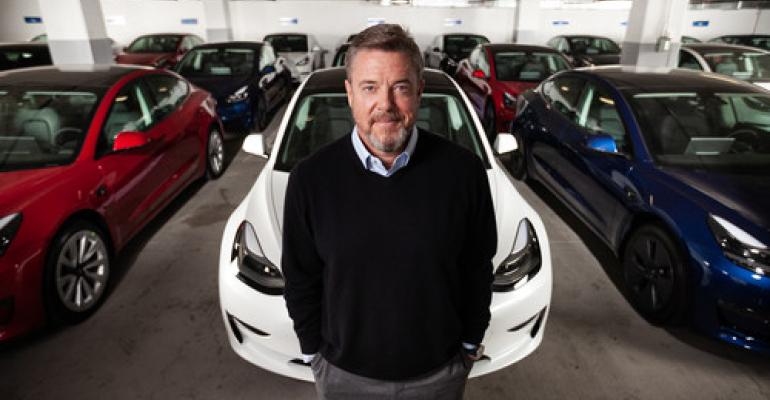Dealers frustrated by shoppers' skittishness about electric vehicles may find an ally in start-up car subscription service Autonomy.
The Santa Monica, CA-based company, founded by serial auto retail and auto finance entrepreneurs Scott Painter and George Bauer, launched this year in California.
Company leaders just announced they ordered $1.2 billion of electric vehicles from 17 automakers, including Tesla, General Motors, Volkswagen and Ford. The approximately 25,000 EVs that Autonomy expects to have by the end of 2023 will supplement the approximately 1,000 Teslas the company has in its inventory for use by about the same number of California subscribers.
Particulars about the orders include prices ranging from $26,595 to $122,400, at least 250 miles of range with a few exceptions and fully connected telematics.
The company is collaborating with AutoNation to provide delivery sites and service for Autonomy-owned vehicles.
"This partnership is about scaling on a national basis. So we will be in all markets across the country," Painter tells Wards. "Obviously, we're in the early innings of the electric transformation, but we really do believe that electric cars are going to be here to stay and that that's what we're going to be driving going forward."
Painter, who founded TrueCar, says the wave of new cars will open different subscription price points. That should allow consumers in many income brackets to try EVs.
Painter predicts that once shoppers experience the Autonomy subscription service, they won't return to buying or leasing. Those that prefer ownership or leases will need to work with dealerships or other retail platforms.
"We are not going to sell you the car. That car, for us, is an important asset. We put that car to work. It generates revenue for us," Painter says. "We're not a retailer. We are in the business of subscribing customers to our cars. We are real pioneers in new vehicle subscriptions. We find that when a customer likes the payment and they like the car, they just stay with it."
As we reported, dealers can make in-roads on EV sales by educating customers about the various incentives available. Respondents to a recent Consumer Reports survey found that 53% were unaware of federal, state and local incentives available to buyers.
For now, Autonomy's electric and zero-emissions vehicle-subscription program in California allows users to choose Tesla Model 3 and Model Y vehicles. There are 10 different payment plans. Start-up fees range from $1,000 to $5,900 with those who pay the higher start-up fees paying less per month.
For example, those who put down $5,900 pay $490 per month while those paying $1,000 up front pay $1,000 a month. The average car payment in the U.S. is currently about $650 per month, he adds.
All subscribers pay $500 security deposits and agree to limit monthly drives to 1,000 miles per month. Subscribers pay 25 cents for every mile over that.
In return, Autonomy pays for the title, registration, insurance and maintenance. Autonomy has partnered with AutoNation to supply all routine maintenance and to serve as a pick-up site for the cars. A $100 fee is charged for delivery to a customer’s home, business or other locale. Subscribers agree to a three-month minimum commitment and can pay a yet-to-be-determined fee to switch cars after completing the initial term.
The schedule for the national roll out is expected in September. And as that occurs, there may be future opportunities for some dealerships to serve as brick-and-mortar touchpoints for Autonomy subscribers.
"We would look for other dealers in markets where we don't have AutoNation coverage," adds Painter. "But right now, we're really focused on prioritizing AutoNation and our national rollout."




